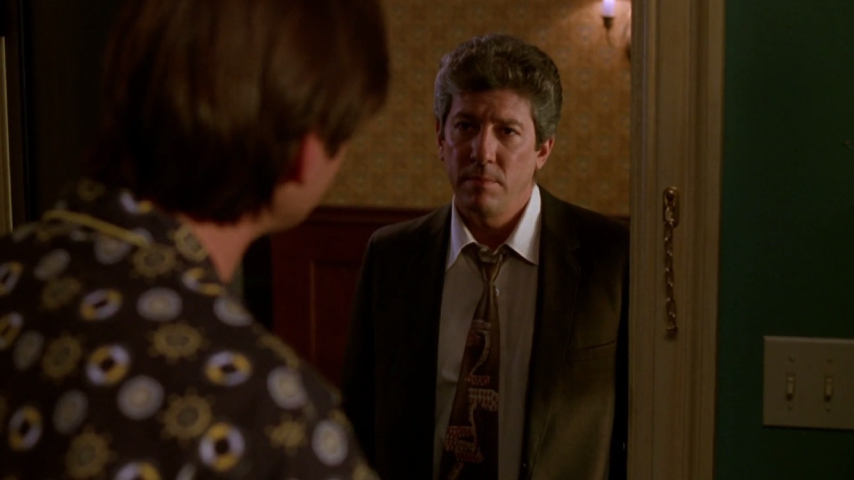Peter Riegert was the secret sauce for The Mask's manic comedy
The actor lent the effects-heavy film a sense of comic timing that works wonders with its star's manic tomfoolery.
Photo: New Line Cinema
There’s a scene midway through Chuck Russell’s 1994 comedy The Mask that stands out as an absolute comic masterstroke—zero CGI cartoon antics required. Stanley Ipkiss (Jim Carrey) squirms under the magnifying glass of Lt. Mitch Kellaway (Peter Riegert), the detective sizing up the lowly bank clerk in his dinky apartment. It’s clear Kellaway isn’t merely questioning Ipkiss about the notorious “Mask” criminal plaguing Edge City; he’s making the case that this gangly weirdo is the culprit.
The joke that’s crucial to this interrogation builds as Ipkiss spins a ridiculous fib about his pajamas—a bizarre, nautical-themed set so hideous that Kellaway had previously deemed them “impossible,” the insinuation being that no rational person would ever wear them. Yet, Kellaway has discovered a scrap of this garish garment at the Coco Bongo nightclub, where he and a small armada of police were outmaneuvered by The Mask (during a lively dance number, naturally). How, how, could the pajamas have ended up there? After all, as Kellaway so curtly puts it, “There can’t be two idiots with pajamas like these.”
And then, Ipkiss’s answer: “Those pajamas were stolen.”
With Kellaway’s response, the scene hits its zenith. Riegert delivers his line—”Someone stole your pajamas?”—with such genuine bewilderment that it pushes an absurd comic scenario into something approaching vaudeville. In contrast to Carrey’s wired performance, the Kellaway’s exasperation is hilarious, and the scene suddenly becomes reminiscent of double acts like Laurel and Hardy or Abbott and Costello—a set piece of contrasting personalities and harmonious comic timing.
This scene is also one of several examples of how Peter Riegert, the unassumingly charming Bronx-born character actor, can elevate any material—even a madcap comic book movie like The Mask—with naught but his deadpan brilliance. With roles in films like National Lampoon’s Animal House and Crossing Delancey, as well as TV shows like Dads, Unbreakable Kimmy Schmidt, and The Sopranos, Riegert has been classing up popular entertainment for over half a century, though his most unsung effort just might be co-starring in The Mask.
Watching the 30-year-old film, it’s not difficult to understand why Peter Riegert gets short shrift when stacked up to its star-making reputation. In 1994, Carrey was already on a hot streak following the unexpected success of Ace Ventura: Pet Detective, which put the young Canadian comic on the road to becoming the late 1990s’ most bankable movie star. His second movie of 1994 (his third, Dumb And Dumber, would further cement his stardom that December), a big-budget lounge lizard riff on a violent and obscure Dark Horse Comics series, was also responsible for launching the superstar career of a fresh-faced Cameron Diaz. Seeing the young actors bebop through a loud big band musical number, with Carrey’s green-faced lothario employing an ACME warehouse full of CG tricks and treats as they swing along, one can forget for a time that anyone else features in the movie.
Yet Peter Riegert looms large in The Mask; when we factor in the movie’s overall harshness, he stands out all the more. Look at where his character lives: Edge City, a crime-ridden hellhole of misery and greed, its vices manifesting in a methane haze of neons that blight its night skies. Nearly everyone has some kind of hustle, from Ipkiss’ abusive rich kid bank manager (Eamonn Roche) and parasite landlady (Nancy Fish) to the crooked auto mechanics (Tim Bagley and Johnny Williams) who take his Honda Civic for an extortionate ride. Then there’s the management at the Coco Bongo, where dwells Dorian (Peter Greene), an ambitious criminal who plots to muscle out his golf club-swinging mob boss (Orestes Matacena).
Edge City is a rough place, and as one of its few straight-shooting public servants, Lt. Kellaway’s cynicism is appropriately caustic. Yet Riegert’s innate charm—his easy smirks, the gentle glint in his eyes, his sharp cadence that suggests a warm sense of humor—makes his character’s attitude feel agreeable.
The script (by Face/Off’s Mike Werb) occasionally allows Edge City’s bile to rise up in Kellaway, as it does in that testy interrogation scene with Ipkiss. His compounding frustration in collaring The Mask explodes during the finale—Kellaway and Ipkiss’s Coyote/Road Runner chase has been nipped in the bud by the mayor (whom Kellaway calls “chunky” before realizing who he’s speaking to)—with his final line (“Shaddap!”), delivered to his dopey partner Doyle (Jim Doughan). It’s the last time we see the character, so Reigert throws a winking sense of bluster behind it, a display of waggish showmanship from an actor who cut his teeth performing in Broadway comedies such as Larry Shue’s The Nerd.
 Keep scrolling for more great stories.
Keep scrolling for more great stories.
